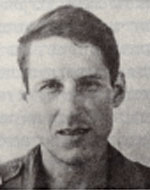Yishai, son of Rivka and David, was born on 26 June 1937 in Kibbutz Tel Yosef in the midst of the bloody events that preceded World War II. After 12 years of schooling, Yishai was recruited to the IDF at the end of August 1956, and volunteered for the Paratroopers Brigade . During basic training he participated in Operation Kadesh and commanded under Rabbi Goren with the units assigned to them to search for missing and fallen soldiers. He also played security roles. When the unit returned to its base, Yishai was sent to a commanding officer’s course, at the end of which he organized the graduation ceremony, where his commanders saw him as a future officer and an excellent instructor, and in the middle of 1957 they sent him to an officers’ course. When his release came from regular service, his commanders pressed him to serve in the permanent army, because they saw him as an excellent commander for the future. He was invited to a conversation with the chief of staff, and when he brought the matter before the kibbutz, his service was fixed. During the entire period of his service, Yishai regularly went to parachuting, and in one of the parachutes he was hit in the back. After a while he needed an operation on his back. He took the post-operative recovery time to prepare for the matriculation exams. In 1961, Yishai married his girlfriend, Nira, and their eldest son, Amit, was born while studying in Haifa, and after completing his studies and familyShe moved to Tel Aviv and her daughter Tal was born. During the Six-Day War, Yishai participated in the fighting on the Rafiah junction and later on in the Gaza Strip and the Gaza Strip, and from there continued on to the Channel on the northern axis. On the second day of the fighting, his men were caught by three unarmed Arabs and when they wanted to be tried, Yishai stood in front of his men with his weapon in his hand and did not allow them to hit unarmed people. His name preceded him because of his bravery and courageous insistence on the purity of his subordinates’ weapons. After the war he was one of the founders of the Haruv reconnaissance unit and served as a senior commander and then a major. During his service in the unit he completed his studies at the Technion and in May 1969 he was awarded a master’s degree. All this was accomplished by intensive operational activity in the head of his soldiers, who were ready to follow him anywhere, to every chase, to every action. In addition to his position, Yishai was involved in the development and upgrading of various means. The IDF can be blessed with tools for blurring roads, finding traces of terrorists, etc. Yishai developed them, and in that year he was transferred to the Intelligence Corps, and upon his recommendation for a change in the position, his commander wrote: “With his talents and education above the accepted level, “In his new position, Yishai found himself dealing with things quite different from those he had been dealing with all these years, bringing his new activity and initiative to his new job and devoting many hours to the new problems that he had played. 1972 Yishai was appointed commanding officer in the south, under the command of Major General Sharon, and moved with The entire family lives in Be’er Sheva. During his career in the regular army and the transfer of his family from one place of residence to another, Yishai maintained close and warm contact with his family and with his kibbutz. He visited the farm very much, knew the name of every newborn baby, knew every house that was set up and every field plowed, including the flock he loved. His letters to his brothers and three younger sisters are full of love and tenderness and are full of interest in everything they are going through and concern about his father’s hard work as manager of the kibbutz metal factory. His stories about parachuting, about his work and his friends and subordinates, are filled with warm and cordial humor, and all of this has a great love for everyone. After seventeen years of service in the IDF, when he was promoted to lieutenant colonel, Yishai decided to leave the army and engage in a profession that he discovered as his true goal after so many years – he gave up the pension that awaited him and decided to move with the family to Kibbutz Afikim In the middle of August 1973, Yishai left the army and in September of that year moved to Afikim, where he managed to stay in his new home for only two and a half months, establish good relations with the kibbutz members and succeed in acquiring the hearts of his students. He waited for the order to read, and when the order did not come, he went to the paratroopers’ base and showed up After several days of reconnaissance in Sinai, he joined an armored battalion under the command of his friend Ehud Brog, and on October 16, 1973, when the battalion was preparing to cross the Suez Canal, an order came to rescue the Paratroopers Brigade and rescue it from the ” On October 17, 1973, the battalion attacked the Egyptian positions in order to destroy them, and Yishai joined the battalion commander’s tank as a machine gunner. A veteran IDF officer, a lieutenant colonel and an engineer, served as a tank crew member and served with his friend, both on the turret, Yishai on the right and Ehud on the left, firing machine guns and grenades at the enemy. He was brought to eternal rest in the cemetery in Tel Yosef, leaving behind a wife, son and daughter, parents, brother and three sisters.Berat called “Ella Habanim”, in memory of the fallen boys. The booklet contains a chapter devoted to the memory of Yishai.
